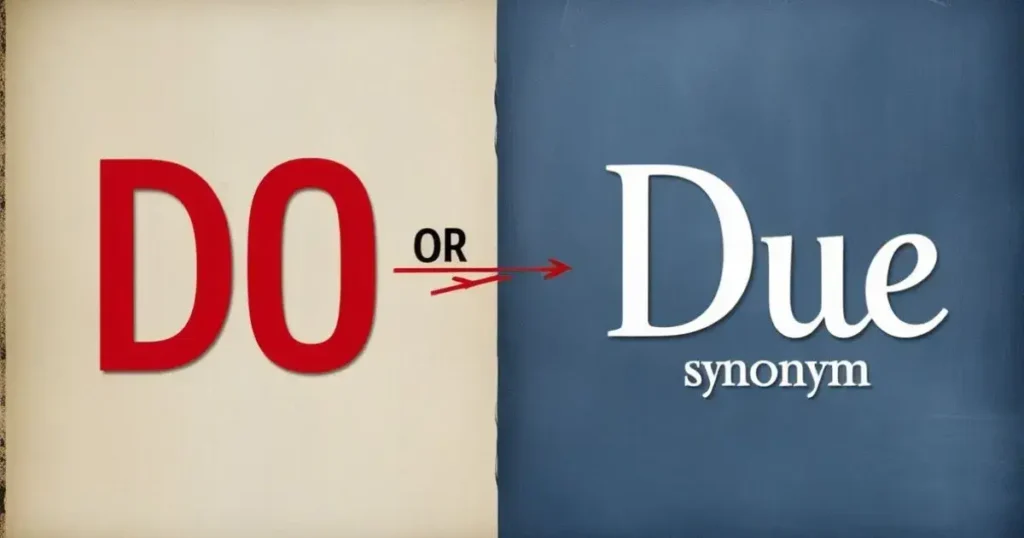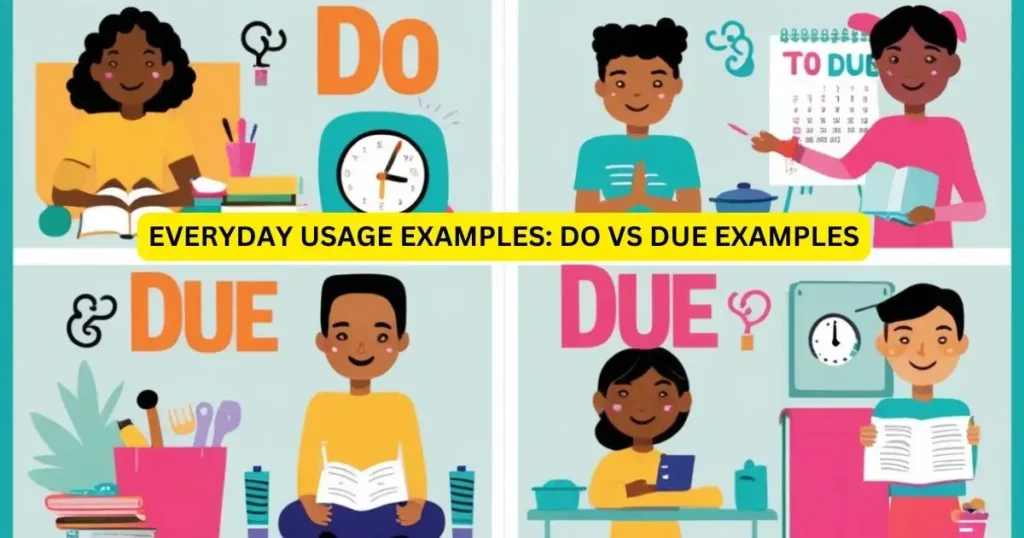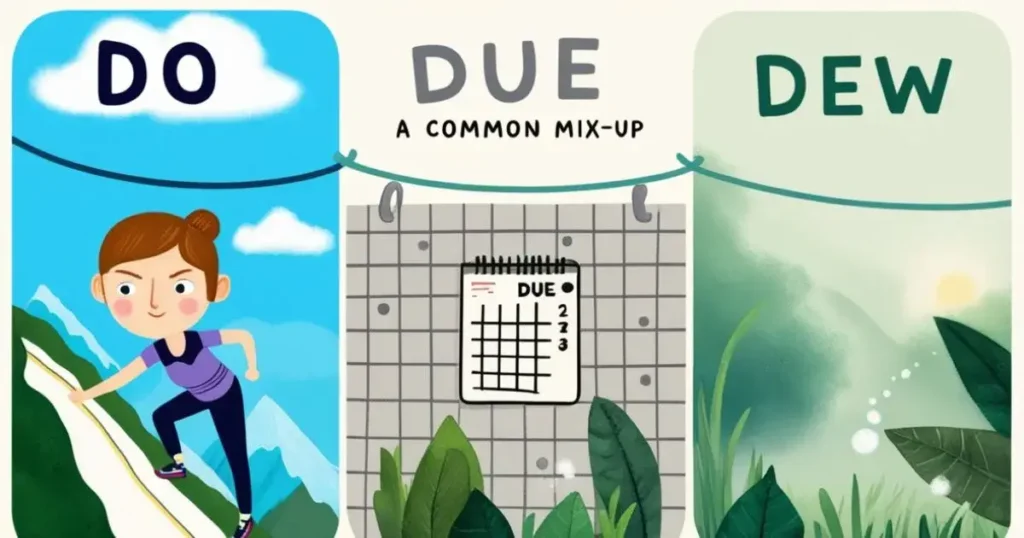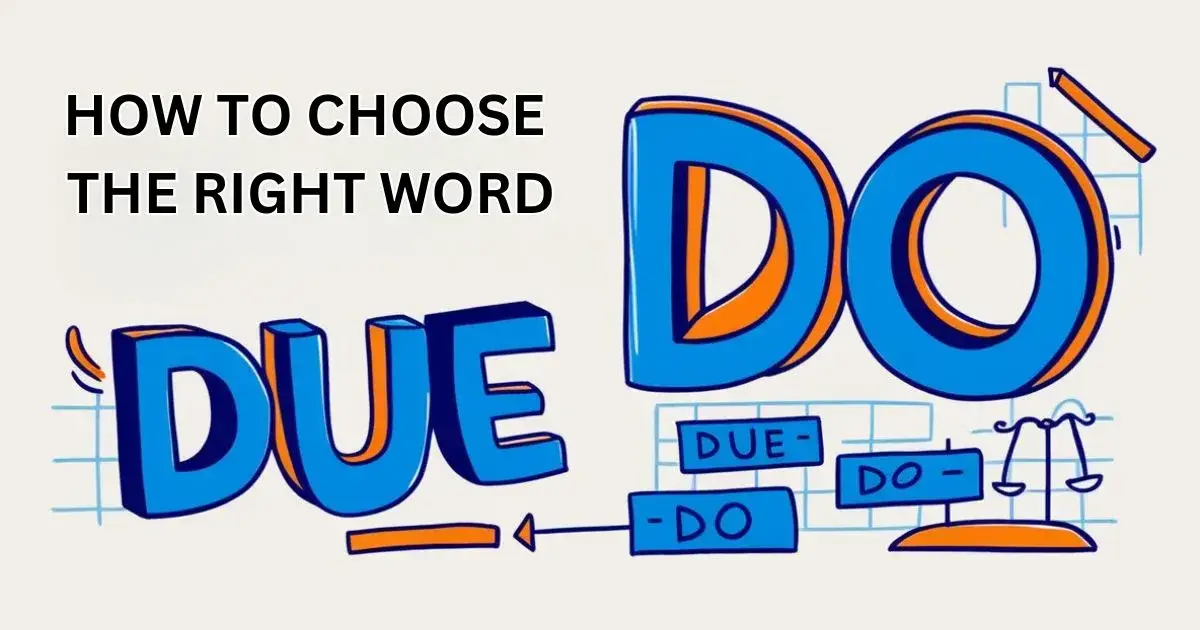The English language often presents challenges in distinguishing words that are similar in sound but have very different meanings and grammatical roles. Two such commonly confused terms are “due” and “do”. These words may sound alike, but their meanings and usage differ significantly. Understanding the difference between do or due is essential for clarity in both writing and speaking. This article aims to clear up the confusion between these terms by providing definitions, examples, and useful tips on when to use each.
Definitions and Usage: The Basics of Due and Do
Do
This is a verb, which means to perform or carry out an action. It can also serve as an auxiliary verb, helping to form questions, negatives, or emphatic statements.
Due
This term can function as both an adjective and a noun. As an adjective, due typically refers to something that is expected or owed. As a noun, due refers to a payment, obligation, or a fee.
Key Differences in Grammar
- “Do” is primarily a verb, indicating action. For example:
- “I need to do my homework.”
- “Can you do this for me?”
- “Due”, on the other hand, is used as an adjective to describe something that is expected or owed, or as a noun referring to an obligation. For example:
- “The report is due tomorrow.” (Adjective)
- “He paid all his dues.” (Noun)
Do Or Due Meaning:
The meaning of due or do is influenced by the context. To do something is to perform an action, while due signifies something expected or owed, such as a task, payment, or event.
Do or Due Synonym

Synonyms for “Do”
- Execute
- Perform
- Complete
- Carry out
- Accomplish
- Achieve
- Undertake
- Fulfill
- Act
Due Synonyms
- Expected
- Owed
- Scheduled
- Anticipated
- Pending
- Unpaid
- Overdue
- Required
- Set for
Comparison Table: Do vs Due
| Aspect | Do | Due |
|---|---|---|
| Part of Speech | Verb | Adjective, Noun |
| Meaning | To perform or execute an action | Expected or owed, a payment or obligation |
| Function | Describes actions or tasks | Describes something that is expected or owed |
| Examples | “I need to do my chores.” | “The report is due tomorrow.” |
| Common Phrases | “Do your homework,” “Can you do me a favor?” | “The payment is due.” |
| Synonyms | Perform, complete, act | Expected, owed, scheduled |
When to Use Each Term
Use “Do” When:
- You need a verb to express an action or task.
- It is used as an auxiliary verb to form questions or negative sentences.
Examples of do in sentences:
- “Do your homework before going out.”
- “I have to do the laundry today.”
Use “Due” When:
- You are referring to something expected or owed, such as a payment, an event, or a deadline.
- You are using it as a noun to refer to an obligation or fee.
Examples of due in sentences:
- “The assignment is due on Friday.”
- “Your payment is due next week.”
Everyday Usage Examples: Do vs Due Examples

Examples Using “Do”:
- “I need to do my grocery shopping today.”
- “She did all the tasks listed on her to-do list.”
- “Can you do me a favor and pick up my dry cleaning?”
Examples Using “Due”:
- “The loan repayment is due at the end of the month.”
- “Her shift is due to start at 9 AM.”
- “The final draft of the report is due by Friday.”
This will do or due:
- Correct Usage: “This will do.”
- Explanation: Here, “do” refers to completing the action. The sentence means that what has been offered or done is acceptable.
Do or Due to the Fact: When to Use
“Due to the fact” is a common phrase used to explain a cause or reason. It is often mistakenly used instead of “because of.”
Example: “Due to the fact”
- “We canceled the event since it was raining.”
More Efficient Way to Say It:
- “We canceled the event because of the rain.”
In formal writing, it’s better to use “because of” instead of “due to the fact”, which is considered wordy.
Do vs Due vs Dew: A Common Mix-up

Do and due are not the only words that sound similar. The word dew, which refers to the moisture that forms on surfaces in the morning, also shares the same pronunciation. Here’s how to distinguish between them:
- Do: Verb, meaning to perform an action.
- Due: Expected or owed, an adjective or noun.
- Dew: Moisture on plants, grass, etc., in the morning.
Example sentences:
- “I need to do my work.”
- “The payment is due on Friday.”
- “The dew on the grass sparkles in the morning light.”
Conclusion
Do and due are two very distinct words that, despite sounding similar, are used in very different contexts. Understanding when to use each term will greatly improve your writing and speaking.
- “Do” is primarily a verb that refers to performing an action or completing a task.
- “Due” is an adjective or noun, usually indicating something expected, owed, or scheduled.
By practicing the proper usage of do or due, you’ll ensure your sentences are grammatically correct and clear. When in doubt, remember that do is an action, and due refers to something owed or expected.

This author is a passionate linguist and grammar enthusiast, dedicated to helping individuals master the art of language. With years of experience in teaching and editing, she brings clarity and precision to every sentence. Tina’s mission is to empower writers of all levels to express themselves with confidence and excellence.

